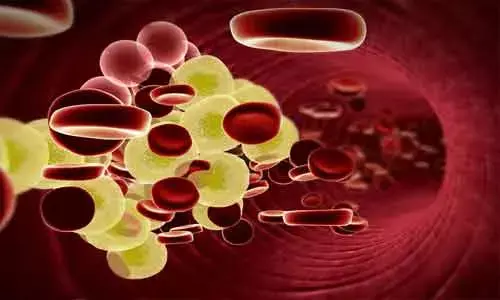- Home
- Medical news & Guidelines
- Anesthesiology
- Cardiology and CTVS
- Critical Care
- Dentistry
- Dermatology
- Diabetes and Endocrinology
- ENT
- Gastroenterology
- Medicine
- Nephrology
- Neurology
- Obstretics-Gynaecology
- Oncology
- Ophthalmology
- Orthopaedics
- Pediatrics-Neonatology
- Psychiatry
- Pulmonology
- Radiology
- Surgery
- Urology
- Laboratory Medicine
- Diet
- Nursing
- Paramedical
- Physiotherapy
- Health news
- Fact Check
- Bone Health Fact Check
- Brain Health Fact Check
- Cancer Related Fact Check
- Child Care Fact Check
- Dental and oral health fact check
- Diabetes and metabolic health fact check
- Diet and Nutrition Fact Check
- Eye and ENT Care Fact Check
- Fitness fact check
- Gut health fact check
- Heart health fact check
- Kidney health fact check
- Medical education fact check
- Men's health fact check
- Respiratory fact check
- Skin and hair care fact check
- Vaccine and Immunization fact check
- Women's health fact check
- AYUSH
- State News
- Andaman and Nicobar Islands
- Andhra Pradesh
- Arunachal Pradesh
- Assam
- Bihar
- Chandigarh
- Chattisgarh
- Dadra and Nagar Haveli
- Daman and Diu
- Delhi
- Goa
- Gujarat
- Haryana
- Himachal Pradesh
- Jammu & Kashmir
- Jharkhand
- Karnataka
- Kerala
- Ladakh
- Lakshadweep
- Madhya Pradesh
- Maharashtra
- Manipur
- Meghalaya
- Mizoram
- Nagaland
- Odisha
- Puducherry
- Punjab
- Rajasthan
- Sikkim
- Tamil Nadu
- Telangana
- Tripura
- Uttar Pradesh
- Uttrakhand
- West Bengal
- Medical Education
- Industry
High ratio of fasting blood sugar to HDL-C tied to CV adverse events, death in ACS patients: Study

China: A recent study reveals that a higher ratio of fasting blood glucose to high-density lipoprotein cholesterol (FG/HDL-C) is tied to a higher risk of MACEs and CV death in acute coronary syndrome (ACS) patients. The study appears in the BMC journal Lipids in Health and Disease on 30 January 2022.
Biochemical markers are critical for determining risk in patients with coronary artery disease (CAD); however, there is no clarity on the relationship between FG/HDL-C ratio and short-term outcomes in ACS patients. Therefore, Xinqun Hu, Central South University, Changsha, Hunan, China, and colleagues aimed to investigate the relationship between the FG/HDL-C ratio and short-term outcomes in ACS patients.
For this purpose, the researchers performed a post hoc analysis using data from a pragmatic, stepped-wedge, cluster-randomized clinical trial. 11,284 individuals with ACS were subdivided into quartiles in accordance with their FG/HDL-C ratios.
The relationship between the FG/HDL-C ratio and short-term outcomes (major adverse cardiovascular events [MACEs] and cardiovascular [CV] death within 30 days) was evaluated using a multivariate logistic regression model, two-piecewise linear regression model, and generalized additive model (GAM).
Following were the main findings of the study:
· The FG/HDL-C ratio was remarkably linked to an enhanced risk of MACEs and CV death in individuals with ACS in the highest quartile (MACEs, odds ratio [OR]: 1.49; CV death, OR: 1.69).
· The GAM suggested that the relationship between the FG/HDL-C ratio and MACEs and CV death was non-linear.
· The two-piecewise linear regression model demonstrated that the threshold values were 3.02 and 3.00 for MACEs and CV death, respectively.
"The study showed that FG/HDL-C ratio may be used as an accessible, convenient, and economical biomarker of short-term outcomes in ACS patients," the authors concluded. "Close attention should be paid to ACS patients undergoing CABG and those aged < 75 years with a high FG/HDL-C ratio."
Reference:
Deng, S., Wang, Z., Zhang, Y. et al. Association of fasting blood glucose to high-density lipoprotein cholesterol ratio with short-term outcomes in patients with acute coronary syndrome. Lipids Health Dis 21, 17 (2022). https://doi.org/10.1186/s12944-021-01618-2
Dr Kamal Kant Kohli-MBBS, DTCD- a chest specialist with more than 30 years of practice and a flair for writing clinical articles, Dr Kamal Kant Kohli joined Medical Dialogues as a Chief Editor of Medical News. Besides writing articles, as an editor, he proofreads and verifies all the medical content published on Medical Dialogues including those coming from journals, studies,medical conferences,guidelines etc. Email: drkohli@medicaldialogues.in. Contact no. 011-43720751


